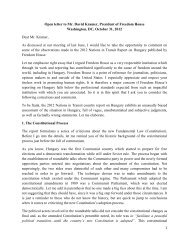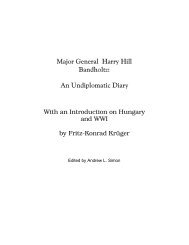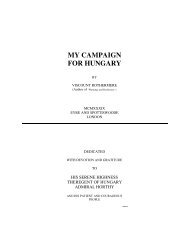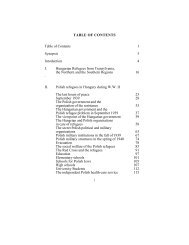The Fate of Western Hungary 1918-1921 - Corvinus Library ...
The Fate of Western Hungary 1918-1921 - Corvinus Library ...
The Fate of Western Hungary 1918-1921 - Corvinus Library ...
You also want an ePaper? Increase the reach of your titles
YUMPU automatically turns print PDFs into web optimized ePapers that Google loves.
associations and nationalistic-hearted population continually (…) raised caution<br />
against the handing over <strong>of</strong> the territory. (…) is the Hungarian government had<br />
insisted on its position on not retreating from the A-line, [then] the entire A-line<br />
[the area lying west <strong>of</strong> it-J.B.] could have been kept, since the Austrians could<br />
have just as easily given it up as they did Sopron, since the losing <strong>of</strong> Sopron<br />
made their Burgenland idea worthless to them. [Sopron was intended to be the<br />
provincial capital <strong>of</strong> Burgenland-ed.] (…) Chancellor Schober admitted later, as<br />
did the Hungarian government, that he was forced to go to Venice only because<br />
<strong>of</strong> the rebels and not because he was forced by the various showy diplomatic<br />
negotiations and tricks. It is possible that Chancellor Schober would have<br />
sought a peaceful arrangement with <strong>Hungary</strong> with an eye to the future, too,<br />
given the trade dependence, in which Austria’s food supply is dependent on<br />
<strong>Hungary</strong> but he could not because he found continuous opposition in the<br />
parties, especially the Greater Germany parties, which always demanded that<br />
the entirety <strong>of</strong> the so-called Burgenland, all the Germans <strong>of</strong> Burgenland be<br />
attached to Austria and then, essentially, annexed to Germany.<br />
That is why the downward negotiation was so damaging (…) – continued<br />
Count Sigray – whose end result was the retention <strong>of</strong> Sopron and ceding the<br />
rest <strong>of</strong> the territory; it was damaging because it did not make use <strong>of</strong> the<br />
successes <strong>of</strong> the rebels. (…) [and] return to a previous weaker <strong>of</strong>fer, which did<br />
not make best use <strong>of</strong> the great successes <strong>of</strong> the rebels. How much this is so,<br />
Honored House, I wish to prove by the declaration <strong>of</strong> the Greater Germany<br />
Party, the same party in Austria that always opposed concessions to <strong>Hungary</strong>,<br />
the Greater Germany party, which, as we shall see, was itself convinced that it<br />
could never gain sway over <strong>Western</strong> <strong>Hungary</strong> if the Hungarian government<br />
does not enter into the Venice Protocol. Here, allow me to read a short section<br />
from the December 30 speech in Linz <strong>of</strong> the president <strong>of</strong> the Greater Germany<br />
Party, Dr. Dingh<strong>of</strong>fer, which contains the following passage (he reads): ‘With<br />
regard to the criticism in the matter <strong>of</strong> <strong>Western</strong> <strong>Hungary</strong>, that the Greater<br />
Germany Party did not reject the Venice Protocol from the beginning, we<br />
answer that we did not want to create a government crisis, because otherwise<br />
Austria could not have expected to keep anything <strong>of</strong> <strong>Western</strong> <strong>Hungary</strong>, not<br />
Sopron, nor the other parts <strong>of</strong> the territory.’ Hence, we can see that the Venice<br />
Protocol, which the government holds up as a prestigious gain, is seen on the<br />
other side, too, as a fortunate solution, and avers that, if the Venice Protocol<br />
had not happened, in that case, it is likely that the Austrians probably would<br />
have got nothing <strong>of</strong> <strong>Western</strong> <strong>Hungary</strong>.” 448<br />
<strong>The</strong> private edition added the commentary to Count Sigray’s speech: “<strong>The</strong><br />
Foreign Minister, Count Miklós Bánffy, replied to the speech but neither he,<br />
nor the head <strong>of</strong> the government [PM Bethlen] refuted any <strong>of</strong> the assertions, in<br />
fact, they were forced to admit that the speech essentially covered the truth.<br />
448 Speech <strong>of</strong> Count Sigray on the resistance in <strong>Western</strong> <strong>Hungary</strong>. (Private edition.)<br />
Athenaeum Irodalmi és Nyomdai Részvénytársulat nyomása. Budapest, 1922, pp. 3, 4,<br />
13, 15. (Source: National Assembly minutes. Budapest, 1922, vol. XV)<br />
176
















